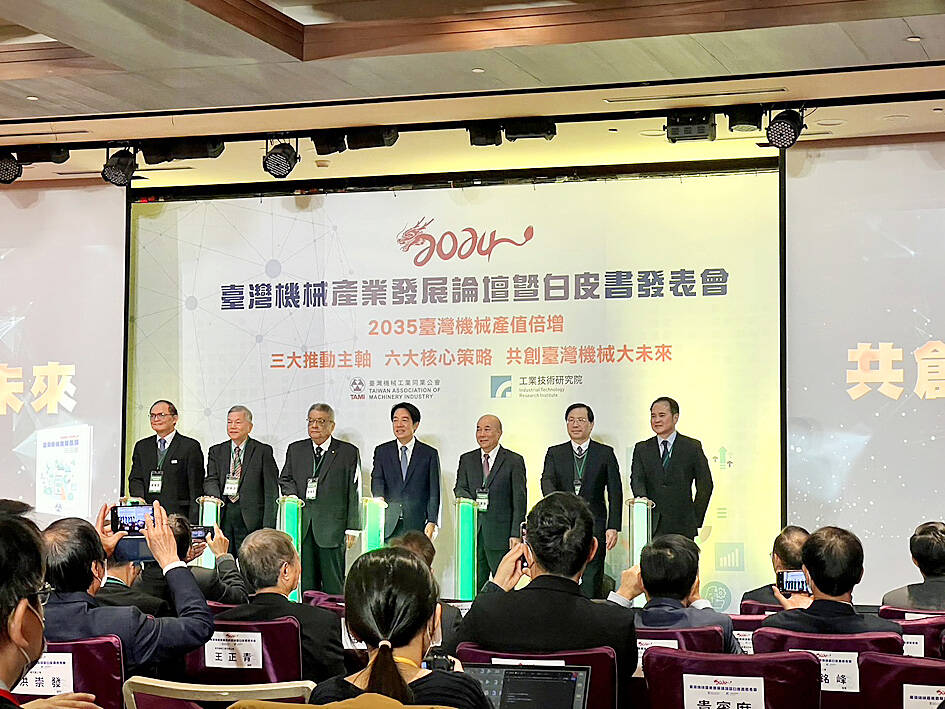The Taiwan Association of Machinery Industry (TAMI, 台灣機械公會) yesterday called on the government to help with technology, research and talent support, as well as other measures, as the industry faces a multitude of challenges.
“The industry has been facing challenges stemming from the US-China trade dispute, Russia’s invasion of Ukraine, rising raw material prices and climate change in the past few years,” TAMI chairman Larry Wei (魏燦文) said at an event in Taipei, while presenting a report to the government.
Vice President William Lai (賴清德) and senior adviser to the president Shen Jong-chin (沈榮津) were among the government officials in attendance.

Photo: Lin Jin-hua, Taipei Times
“We hope the government can help foster a better academia-industry environment for collaboration and assist association members in cultivating talent and improving international marketing. We also expect to obtain subsidies for the development of homegrown machinery and equipment and other government support for sustainable operations,” Wei said.
The machinery industry plays an indelible role in Taiwan’s economy, TAMI said, adding that it consists of more than 14,000 firms with 270,000 employees.
Due to a global economic slowdown, the nation’s machinery exports last year fell 15.3 percent year-on-year to US$29.47 billion, while its total production value plummeted 16.5 percent to NT$1.21 trillion (US$38.33 billion), it said.
Last month, machinery exports grew 8.2 percent year-on-year, ending 17 consecutive months of declines, which Wei said was a “sign of life” amid an improvement in the global economy, adding that he expected the industry to show a “gradual recovery” throughout this year.
Overall production value this year is expected to recover to the 2022 level of about NT$1.45 trillion, he said, citing a pickup in orders for machine tools, plastic and rubber machines, as well as woodworking and metal cutting tools.
TAMI projects three major goals for the machinery industry by 2035: Doubling the annual production value to NT$3 trillion, achieving an added value rate — which is the ratio of added value to production value — of more than 35 percent, and elevating production value per capita to NT$6 million.
To achieve these goals, the association has proposed measures to help its members better engage with customers, enhance their presence in foreign markets and improve the industry’s global competitiveness, it said.

Intel Corp chief executive officer Lip-Bu Tan (陳立武) is expected to meet with Taiwanese suppliers next month in conjunction with the opening of the Computex Taipei trade show, supply chain sources said on Monday. The visit, the first for Tan to Taiwan since assuming his new post last month, would be aimed at enhancing Intel’s ties with suppliers in Taiwan as he attempts to help turn around the struggling US chipmaker, the sources said. Tan is to hold a banquet to celebrate Intel’s 40-year presence in Taiwan before Computex opens on May 20 and invite dozens of Taiwanese suppliers to exchange views

Application-specific integrated circuit designer Faraday Technology Corp (智原) yesterday said that although revenue this quarter would decline 30 percent from last quarter, it retained its full-year forecast of revenue growth of 100 percent. The company attributed the quarterly drop to a slowdown in customers’ production of chips using Faraday’s advanced packaging technology. The company is still confident about its revenue growth this year, given its strong “design-win” — or the projects it won to help customers design their chips, Faraday president Steve Wang (王國雍) told an online earnings conference. “The design-win this year is better than we expected. We believe we will win

Chizuko Kimura has become the first female sushi chef in the world to win a Michelin star, fulfilling a promise she made to her dying husband to continue his legacy. The 54-year-old Japanese chef regained the Michelin star her late husband, Shunei Kimura, won three years ago for their Sushi Shunei restaurant in Paris. For Shunei Kimura, the star was a dream come true. However, the joy was short-lived. He died from cancer just three months later in June 2022. He was 65. The following year, the restaurant in the heart of Montmartre lost its star rating. Chizuko Kimura insisted that the new star is still down

While China’s leaders use their economic and political might to fight US President Donald Trump’s trade war “to the end,” its army of social media soldiers are embarking on a more humorous campaign online. Trump’s tariff blitz has seen Washington and Beijing impose eye-watering duties on imports from the other, fanning a standoff between the economic superpowers that has sparked global recession fears and sent markets into a tailspin. Trump says his policy is a response to years of being “ripped off” by other countries and aims to bring manufacturing to the US, forcing companies to employ US workers. However, China’s online warriors